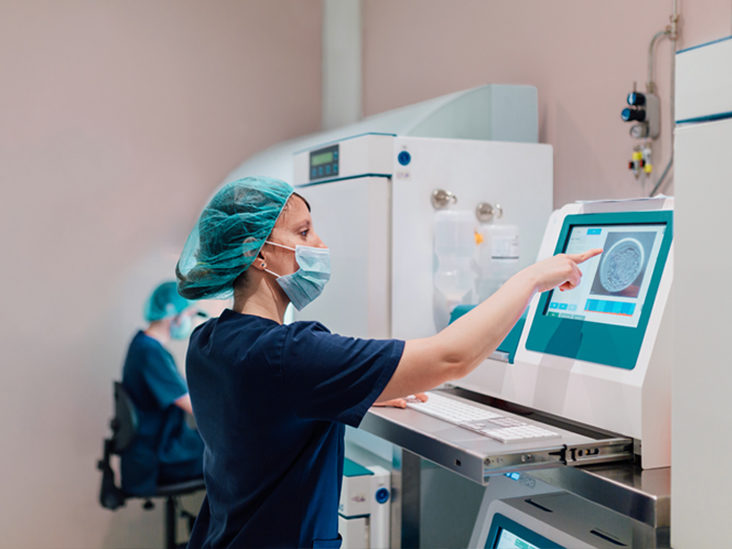ART comprises techniques in which oocytes are fertilized outside the organism’s body. In vitro fertilization, commonly known as IVF, is an assisted reproductive technology (ART) procedure in which eggs and sperm are put together in laboratory petri dishes for fertilization.
Initially, IVF was developed to overcome irreparable tubal disease, but it is an effective infertility treatment today. The first live birth through IVF happened in 1978 in England. Since then, the field of reproductive endocrinology/infertility has advanced rapidly.
In Pakistan, the prevalence of infertility cases is 22%, with 4% of the total cases accounting for primary infertility. This high prevalence of infertility in the country is due to unawareness regarding the causes of infertility.
Fertility specialists are trained to aid couples facing fertility issues. Our fertility specialists have the expertise to treat infertility by determining the underlying cause so they can recommend the best treatment options that may help you conceive.


Ovarian Stimulation: The ovaries usually produce one egg each month; therefore, ovaries are stimulated with Follicle-stimulating Hormone (FSH) or luteinizing hormone (LH), so ovaries may have the maximum amount of eggs per month. It is done to increase the chances of successful fertilization. The hormones are monitored throughout this stage to keep check and balance and determine the dosage frequency.
Egg Retrieval: It takes about 30 minutes to retrieve eggs. However, it is quite a delicate procedure. Before the process, the patient is sedated, and the specialist rescues follicles with the help of a needle connected to a suction from the ovaries. Eggs are retrieved after about 36 hours of giving a trigger shot.
Fertilization and Embryo Development: The retrieved eggs and sperm are combined in laboratory petri dishes and allowed to incubate. Here, the sperm fertilizes the egg on its own. Once the eggs are fertilized, they develop into embryos. The embryos are monitored till they reach the blastocyst stage.
Embryo Transfer: The embryologist selects the highest quality embryo for implantation. During this stage, anesthesia is not required. A thin catheter containing the embryo is passed through the cervix into the uterus, where the embryo is implanted.
Luteal Phase Support: LPS (Luteal Phase Support) is vital to assisted reproduction. It generally comprises progesterone, progestins, hCG, or GnRH agonists to enhance the success rate of embryo implant and early embryogenesis. It thickens the uterine lining and prepares it for pregnancy. For fertilized eggs, a thick uterine lining is an ideal environment to grow.
Medications and Protocols: FSH and LH are administered during ovarian stimulation to increase the egg count. For luteal support, hCG, GnRH, progesterone, progestins are given to thicken the uterine lining. The frequency and dosage of medications are administered throughout.
For couples unable to conceive or who have failed at IUI, IVF treatment is an opportunity to achieve parenthood. It can also help in diagnosing fertility issues.
Causes of Infertility
In Women
• Endometriosis
• Ovulation disorders
• Premature ovarian failure
• Uterine fibroids
• Blockage of cervix
• Blocked/Damaged fallopian tubes
• Age
• Lifestyle
In Men
• Low sperm count
• Low testosterone
• Poor sperm motility/morphology
• Undescended testicles
• Varicocele
• Chronic health problems
• Lifestyle
When to Consider IVF: A couple who has been trying to conceive for 12 months (when the woman is under 35) or 6 months (when the woman is above 35) and has not been successful should consider going for assisted reproductive technology procedures. If the chances of achieving pregnancy through IUI are low, the couple is advised to undergo IVF treatment.
Age and IVF: Age plays a vital role in the success of IVF. Data has shown that women under 35 have a greater chance of successful IVF treatment than women above that age. With age, women’s fertility decreases, and at 40, they only have about a 20-30% chance of achieving pregnancy, considering their overall hormonal and reproductive health is normal.
Age and Success Rates: Age is an essential factor that impacts the success of an IVF treatment. With the increase in age, the probability of IVF success decreases. The success rate of IVF resulting in live birth is 31% in women under the age of 35, 24% in women 35-37, and only 16% in women who are 38-40.
Lifestyle and Health: A balanced lifestyle and healthy diet provide the human body with adequate vitamins, nutrients, and minerals that are necessary for the production of healthy sperm and eggs, which ultimately increases the chances of IVF success. With age, the quality of egg and sperm decreases, and poor lifestyle habits can worsen the case.
Previous Treatments: Previous fertility treatment can impact your IVF success rate. For instance, if you were unsuccessful in achieving pregnancy in the first cycle of IVF, your chances of pregnancy may increase in subsequent embryo transfer. The statistics vary with the age of women. In women under 35, the next embryo transfer will have a 47% chance of success, while in women aged 35-37, there is a 44.7% chance to achieve pregnancy successfully in the case of a second embryo transfer.
Risks and Complications: Although IVF is a safe process, there are some potential risks and complications, such as,
Ethical Considerations: IVF has been subjected to various ethical concerns since its introduction. During IVF, the rights of the couple and the baby (yet to be born) must be considered. Our team of specialists at Australian Concept makes our patients undergo pre-implantation diagnosis to determine whether they have any genetic abnormality. We keep the welfare of the children as our priority, and we act in the best interest of our patients.
Financial Considerations: IVF costs in Lahore range from 600k to 900k. Considering the uncertainty of success, this high cost is only affordable for some couples. Australian Concept believes no team should remain childless because they cannot afford the treatment. Hence, we offer discount packages and flexible payment methods to our clients. We also have a financial assistance program for those unable to bear the expenses of IVF treatment.
Alternative Option: IUI (Intrauterine Insemination) is an alternative to IVF.

Accreditation and Certifications: Australian Concept is an ISO-certified fertility clinic with 20+ years of experience in the field. It has aided over 1000s of domestic and international patients in achieving parenthood. Pakistan’s Consumer Association has also awarded it the ‘Best Infertility Clinic of Pakistan.’
Experienced Team: We have a team of the most highly qualified and experienced infertility specialists from Pakistan who have rich experience in dealing with and treating complex infertility cases. Our health care staff is well groomed and empathetic and offer their assistance round the clock to our patients.
Success Rates: Australian Concept Lahore infertility clinic is the best clinic in the country with the highest success rate. We have helped over 1,000 couples in living their dream of parenthood.
Facility and Equipment: We have the most technologically advanced facilities and equipment available at our Lahore branch that meets international standards. We are Lahore’s first and only IVF centre using a multi-chamber MIRI Time-Lapse Incubator.
Location and Accessibility: Australian Concept Lahore is located at a private site that is easily accessible to everyone. The area has been chosen, keeping the convenience of our patients in view. We are in Barkat Market, 116-A, near Salar Center, Babar Block Garden Town, Lahore, 54000.
What is IVF Cost in Lahore?
The cost of IVF in Lahore ranges from 600k to 900k. The complete price is discussed in detail with our patients during consultation. There are no hidden costs, and we ensure our patients know where they invest.
What is the Success Rate of IVF?
There is no medical treatment that ensures 100% success, as is the case with IVF. The success of IVF depends on several factors, including age. Age plays an important role in the success of an IVF treatment. The success probability of IVF decreases when the age increases.
Is there any Age Restriction for IVF?
There is no age restriction for IVF. However, the chances of successful IVF treatment are less in women over 40, but it is not impossible.
What is the Duration of IVF?
IVF consists of a series of stages, including initial consultation, stimulation of ovaries, egg and sperm retrieval, fertilization, embryo transfer, and pregnancy test. One IVF cycle takes about 6 to 8 weeks to complete. The duration varies with each individual’s response to medications.